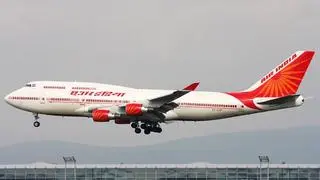India’s ambition of becoming an aircraft leasing hub got some tailwinds in the 2021-22 Budget as the government announced a tax holiday for capital gains for aircraft leasing companies along with tax exemptions for aircraft lease rentals paid to foreign lessors operating out of the country’s sole International Financial Services Centre (IFSC) in Ahmedabad.
In October last year, the Finance Ministry had notified “aircraft lease” as a financial product that could be transacted in the Gujarat International Finance Tec-City (GIFT), a global financial and IT hub.
This is an important step as almost 80 per cent of aircraft operating in the country are on lease. This figure stands at about 50 per cent for the rest of the world (the other aircraft flown by airlines are owned by them).
Little wonder then that industry watchers and analysts have hailed this announcement. According to Sumit Singhania, Partner, Deloitte India, Indian airliners have a fairly strong order book with more than 900 aircraft expected to be acquired (purchased or leased) till 2024.
“Hence, the preferential tax regime proposed in the Budget for aircraft leasing out of GIFT City is an important step towards developing India as a regional aircraft financing hub,” he says. Singhania adds that waiver of income tax withholding on lease rentals paid to overseas original equipment manufacturers (OEMs) or lessors could reduce financing costs of aircraft by nearly 10 per cent in most cases.
Jagannarayan Padmanabhan, Director & Practice Leader — Transport & Logistics, Crisil Infrastructure Advisory, agrees. For low cost airlines in India, fuel costs are 30-35 per cent, employee costs are 10-12 per cent and lease rentals (including supplemental lease) are 12-15 per cent of the total expenses (fiscal 2020 figures), he points out.
“The IFSC unit engaging in aircraft leasing has been exempted from transfer tax /capital gains on the sale of such aircraft to Indian airliners, making the overall landing costs more competitive,” Singhania adds.
The most significant impact of India becoming an aircraft leasing hub will be on airlines’ operating costs which could potentially go down. Industry watchers says that in the third quarter of fiscal 2019, a low-cost airline paid around ₹52 lakh per aircraft in leasing costs, including a tax of 10-15 per cent that it had to pay to the authorities.
With the implementation of Budget proposals 2021-22, airlines will not have to pay this tax which will help save costs.
Tushar Sachade, Partner Deals Tax, PwC India adds, “This is probably India’s first firm step to becoming an eventual alternative to sector favourites like Ireland and Hong Kong.” At the moment, most airlines in the country lease aircraft from abroad, including from Ireland and Hong Kong.
However, some voice caution. The announcement is just the first step and it will be a while before it becomes a reality. According to Poonam Verma, Partner, J. Sagar Associates, it may be 2-15 years before an Indian airline starts leasing aircraft from GIFT City. She further points out that this will depend on how the government makes aircraft leasing more lucrative for Indian carriers.
“Ireland took 10-15 years to take off and about 30 years to become an aircraft leasing hub,” she says, adding that Indian carriers will have to see if it works for them.
“There has to be a beginning. Who will start it only time can tell,” Verma says.
Singhania, too, cautions that the move may not immediately lead to lower fares as unlike a GST levy which is directly passed on to consumers, this income tax upside may not immediately translate into lower airfares.
He adds that more policy alignment will be required to prop this newly incubated industry in IFSC both in the form of fiscal measures (such as zero rating /GST exemption on aircraft import) and regulatory policy support.







Comments
Comments have to be in English, and in full sentences. They cannot be abusive or personal. Please abide by our community guidelines for posting your comments.
We have migrated to a new commenting platform. If you are already a registered user of TheHindu Businessline and logged in, you may continue to engage with our articles. If you do not have an account please register and login to post comments. Users can access their older comments by logging into their accounts on Vuukle.